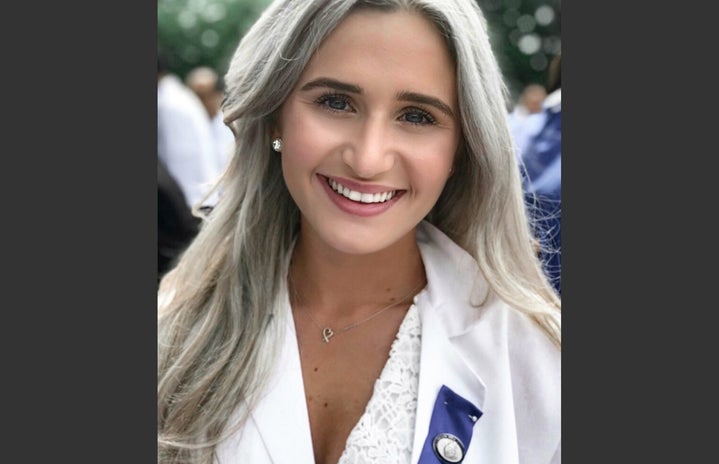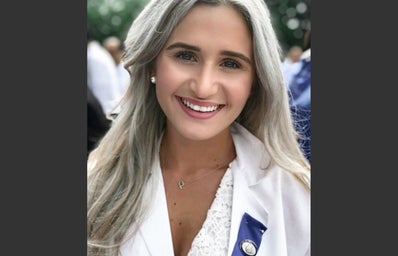Since early March, coronavirus numbers have been increasing exponentially in the United States. With that comes the huge reliability of our nurses and doctors to keep us safe. I was fortunate enough to interview a close family friend of mine, Keirhan, who is a nurse at a hospital in New Jersey– the heart of the outbreak. Despite working long shifts during this pandemic, she took time on her day off to answer some questions I had.
Her Campus: What made you want to become a nurse?
Keirhan: I’ve always known I wanted to be a nurse! I believe I’ve always had this passion [for] nursing due to my desire to care for others and love for the medical field!
HC: Can nursing school even prepare you for something like this?
K: Absolutely not! In nursing school, you briefly learn about disaster plans in the case of a natural disaster or bioterrorism in a lecture format. Reading something on a PowerPoint is far different than living it. Not only that, in nursing school you learn to take care of an infectious patient with the proper PPE. For example, an N95 is supposed to get disposed of after every encounter with a patient. Now, you are expected to keep your N95 all shift in a paper bag and use it to go into multiple patients’ rooms.
HC: How do you feel being a nurse so close to New York City—the most affected area?
K: I wouldn’t say that I feel any sort of way towards it. It was easy to conclude that New Jersey was going to be hit hard once New York did because of the enormous about of commuters and close proximity.
HC: Describe your average day as a nurse during this virus.
K: Ah, no day is average anymore! First off, I’m hired to be an Operating Nurse and my shift is seven to three, Monday through Friday. Since this virus has hit, most of the OR staff has been floated to various COVID units and switched to 12-hour shifts, including days, nights and weekends. So now, I’ve been working days and nights in our ICU unit. We are given PPE to care for these patients such as face shields, gowns and masks but have to keep our N95 in a brown paper bag when not in use.
HC: Have you dealt with people who have the virus, and if so, what is the scariest part about it that you’ve seen?
K: Yes! The scariest part of caring for these patients is you could be doing everything to protect yourself and protect your loved ones at home from this virus, but you could still carry it. Being as if you can be positive and asymptomatic, you are constantly worried that you can transmit it to the people you live with.
HC: How is your hospital handling it? Do they have a lot of cases? Is it getting near capacity?
K: My hospital is handling it well and is providing us with the necessary tools to care for these patients. It seems like every few days we are clearing out a floor to make it another COVID floor. I’m not sure about the exact number of positive patients or possible positive patients, though. I also don’t know if we have reached capacity yet, but I do know that other hospitals in the county have, and they are diverting patients to our hospital.
HC: How are you handling the stress of this emotionally?
K: During my days off I like to take some leisurely walks and practice yoga. Being as my entire “routine” has been thrown off, I like to keep some normalcy by doing things I usually do. At times, I get very nervous and anxious before work because I simply don’t know what my shift will bring.
HC: How are you protecting yourself and your family?
K: Of course, I wear my PPE when in contact with my patients, but I take other precautions as well. I stopped bringing my work bag and started carrying a small Lulu Lemon bag that can be disinfected to carry my lunch/dinner. Multiple times throughout my shift I disinfect my phone, pen and badge as well as right before leaving the hospital. Once I get home, I take off my shoes outside, leave my bag at the front door and immediately shower in a bathroom no one else uses. My clothes go into a hamper in which I wash with hot water. If I were to develop symptoms, I would quarantine in a guest room and have limited contact with everyone else in the house!
HC: What can we do to help nurses and doctors?
K: Support! We love seeing all the support from family members, friends, businesses in our area and pure strangers. There has been an overwhelming amount of support on social media and it definitely does not go unnoticed! It is an amazing feeling to know that we have the support of the entire world beside us.
Want to see more HCFSU? Be sure to like us on Facebook and follow us on Instagram, Twitter and Pinterest!



